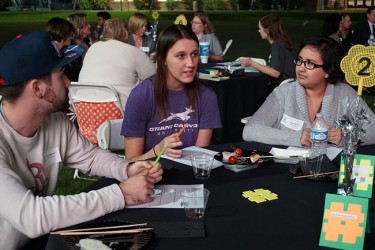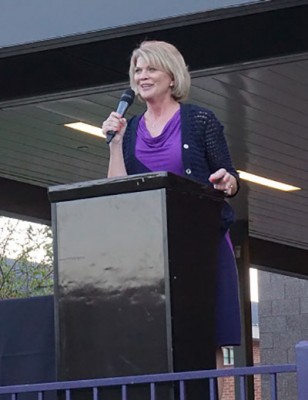By Jeannette Cruz
GCU News Bureau
We’ve all heard the saying, “It takes a village to raise a child,” which is why the Educators Rising club at Grand Canyon University aimed to increase exposure on the topic of early education Thursday.
Educators Rising, a network of students and teacher leaders inspired and excited by the teaching profession, shared their message of understanding and hope to improve early education with a 30-minute film and a panel discussion.
College of Education professor Katie Sprute was behind the screening of the PBS documentary “The Raising of America: Early Childhood and the Future of Our Nation,” a five-part series that explores how a strong early start is the foundation for future success. The film addresses questions such as, “What can be done to better assure the conditions of all infants and young children?” and most important, “Will America invest in its youngest children?”
Educators Rising focused on the segment, “Are We Crazy About Our Kids?”, which studied the cost and benefits of high quality early care and preschool, following the Perry Preschool Project, and traveled to Quebec, where affordable child care is between $5 to $7 a day.
“It speaks a lot to what we do here at GCU because what we are doing is trying to educate and prepare our future leaders into becoming advocates in their field,” Sprute said. “By engaging our audience in a conversation about the quality of early childhood care and the outcomes of those who do receive high quality care and what the economic benefits and pitfalls are to providing it as well, we are building answers to the question of, How can we help?”
Sprute said she came across the film while designing two courses for a new early childhood special education program planned for 2017.
“I remember thinking, ‘This speaks to me, this is my experience, because it was only a year ago that I was struggling with the decision to return into work.’ I was a new mom. I had a 9-month-old. I was seeking out qualified caregivers, and this was the first time it would be someone outside of myself and my family,” Sprute said.
Approximately 60 people were present, and among them were students, teachers, occupational therapists, superintendents and members of early childhood education organizations.
Panelists included Tracey Beal, pastor of community development at Pure Heart Christian Fellowship; Eric Bucher, vice president of Professional Development on the Arizona Association for the Education of Young Children; Dr. Kim Guerin, director of elementary education for the Paradise Valley Unified School District; Kristie Martorelli, professional development coordinator at Dysart Unified School District; and Andrew Morrill, president of the Arizona Education Association.
Dr. Kimberly LaPrade, dean of the College of Education, said the crowd was an example of how it takes a village to prepare a future with educators.
“Our legacy rests on our students and their preparedness by their faculty,” she said. “They are the two most important ingredients in what we do so that we can ensure that all children have a great teacher. That is our passion and that’s what we come to work every day trying to do.”
After the film, panelists touched on policy, practice and what educators can do to elevate early childhood in Arizona when they were asked, “In what ways are you and the group you represent addressing the challenges identified in the video?” and “How will Arizona’s Proposition 123 change?”
Guerin said that when she was principal of a Title 1 school, she noticed at least two-thirds of the students at her school were reading below bench mark and she pushed for intervention.
“We looked for creative ways to meet the needs of each individual child, and in doing that we helped student achievement go up and it was worth the effort,” she said.
Morrill said AEA is made up of 20,000 educators who all are focused on a mission to improve students academically, civically and ethically.
“We believe in fairness and respect for everyone,” he said. “To be a teacher is to be in some level through DNA fundamentally optimistic.”
In response to Proposition 123, he said AEA negotiated “aggressively and directly” with the state of Arizona for five billion dollars to go back into K-12 funding.
“But here’s the kicker,” he added. “It calls for the voters to seal the deal during the special election on May 17.”
Martorelli responded by adding that teachers are tired of feeling as if education is not valued in the state of Arizona.
“It will be very detrimental for voters to say they don’t care about education enough to vote for this because that is our opportunity to give a different message to our schools and our teachers,” she said.
Moving forward, the big question for the audience was, “What will you do next to reach your community?”
“It’s very affirming that we are all on the same page,” said Marjaneh Gilpatrick, GCU’s executive director of educational outreach. “I’m encouraged that we have great resources that can help us and that we each have a part to play.”
Dawn Shaw, an early childhood education major, said she understands how much young children need early intervention:
“As much as we don’t want to put dollar signs on students, those empowered do put it on them. So we need to show that they are a huge investment for the future.”
Contact Jeannette Cruz at (602) 639-6631 or [email protected].







































































